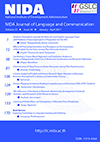Learning of Media Ethics via Participation in Television Series Production
Keywords:
learning by doing, media ethics, participation, television series production.Abstract
The objective of this qualitative research was to probe a learning by doing approach in teaching media students the required media ethical issues by tasking them to produce television series. At present, various media contents, such as, television dramas, news talk shows and advertisements, have often been criticized for their lack of ethical judgement. Aiming to design an effective approach for students to learn media ethics, the researcher confidently postulated that the learning by doing approach in which students take a full participation in producing television series would enable them to acquire the awareness of media ethical issues as well as make informed decisions on ethical issues.
The television series production processes were divided into three main steps (pre-production, production and post-production). Students participated in every step. In the first step, students were tasked with writing their preferred script of a television series highlighting media ethical problems. In the second step, students produced a television series. In the third step, students presented their television series to the public.
The project revealed that students’ participation in the production of television series helped students develop an active response to the problems of media ethics. This approach was also found to offer students a sense of self-contentment of having develop their informed judgment and their sharp criticisms of the media contents violating media ethical issues. In conclusion, students’ active learning and direct participation in producing television series can be a satisfactory teaching method of media ethics and an important opportunity for students to enjoy making their own television series.
Downloads
How to Cite
Issue
Section
License
By submitting a manuscript, the author transfers the copyright for the article to School of Language and Communication, National Institute of Development Administration (NIDA), if and when the manuscript is accepted for publication. Though the journal is an open-access, reproduction of any material published in NIDA Journal of Language and Communication for non-personal and/or commercial purpose requires a written permission from School of Language and Communication, National Institute of Development Administration (NIDA).






